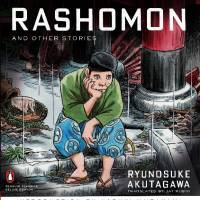It is noticeable that the tales in "Rashomon and Seventeen Other Stories" by Ryunosuke Akutagawa change in tone and style alongside the mental state and interests of the writer. Akutagawa's most famed early works (including the titular story) are intricately woven setups for moral questions, whereas his later stories highlight a derailing mind.
Like many Japanophiles, I was already familiar with Akira Kurosawa's movie "Rashomon," so it was a surprise that the "Rashomon effect" (various people recalling the same events differently) takes place in another story (in a bamboo grove). Kurosawa decided to feature elements of both stories in his movie.
Another early highlight in this collection is "Hell Screen," a story about an artist hurtling toward insanity due to his creative impulses. "Hell Screen" becomes a foreboding story when considered alongside the knowledge of Akutagawa's suicide at 35.
Akutagawa's later stories lack the dramatic focus of his earlier ones, as his mental-health issues began to hinder his ability to write. "Spinning Gears" is the finest of these troubled later works, a seemingly autobiographical story of the writer detailing the inner lonesome world of his struggle to stay centered.
It would have been interesting to see where Akutagawa would have gone in later life, or whether he'd have been able to harness his nervy mind into maturity, but we find in "Rashomon" and other stories a diverse collection of short fiction to keep alive enjoyment of the unique talent he was.
Read archived reviews of Japanese classics at jtimes.jp/essential.



















With your current subscription plan you can comment on stories. However, before writing your first comment, please create a display name in the Profile section of your subscriber account page.